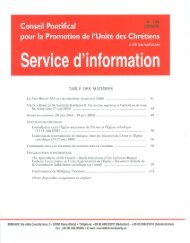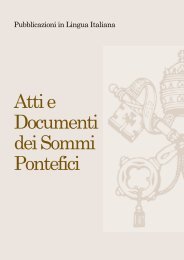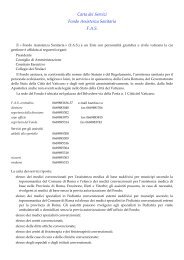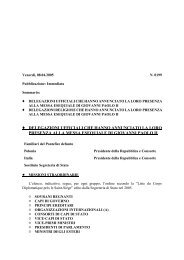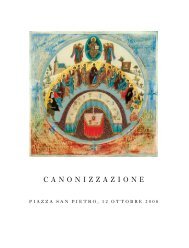DOCTOR COMMUNIS - Vaticano
DOCTOR COMMUNIS - Vaticano
DOCTOR COMMUNIS - Vaticano
You also want an ePaper? Increase the reach of your titles
YUMPU automatically turns print PDFs into web optimized ePapers that Google loves.
88<br />
LAWRENCE DEWAN, O.P.<br />
We see, also, that in this text supposedly contemporaneous with Q2,<br />
the explanation of the accidentality of predication in the answer to “is it”<br />
is quite different from that given in Q2. There, it was the distinction<br />
between the essence and the act of being which made for accidentality.<br />
Here, it is the priority of extramental natural being over being in the<br />
human mind which explains it. 21<br />
What does Averroes actually say? 22 His crucial comment is as follows:<br />
Sed debet scire universaliter quod hoc nomen ens quod significat<br />
essentiam rei est aliud ab ente quod significat verum, et ideo expositores<br />
diversantur in quaesito simplici, scilicet dicere verum aliquid<br />
est in secundo Topicorum, 23 utrum collocetur in quaestionibus accidentis<br />
aut generis. Qui enim intelligit de ente illud, quod est commune<br />
decem praedicamentis, dicit quod collocatur in quaestionibus<br />
generis; et qui intellexit de ente illud, quod intelligitur de vero, dicit<br />
quod collocatur in quaestionibus accidentis. 24<br />
I.e. Averroes distinguishes carefully between the earlier seen meaning of<br />
“ens” which signifies the essence, divided by the categories, and the “ens”<br />
21 Q2 presents the distinction between essence and act of being in creatures as the reason<br />
why there are the two questions, “what is it” and “is it”, and links this with the explanation<br />
of accidentality of predication for the reply to “is it”. CM 5.9 explains the accidentality<br />
by the priority of extramental being itself over our knowledge of that being. This latter<br />
explanation accords with the idea that God’s knowledge of creatures does not have the<br />
mode of composition and division [cf. ST 1.14.14], and neither does angelic cognition [cf.<br />
ST 1.58.4], i.e. it is not the ontology of creatures that gives rise to questioning and gradual<br />
knowledge; it is rather the weakness of human intellectual light [1.58.3 and 4].<br />
22 The texts of Aristotle and Averroes are to be found in Aristotelis Metaphysicorum<br />
libri XIIII cum Averrois Cordubensis in eosdem Commentariis etc., Venetiis apud<br />
Junctas, 1562 [t. 8 of the Opera Aristototelis cum Averrois Commentariis], 5, text. 14 [fol.<br />
116vo-117ro]. The Aristotle text has:<br />
Et etiam ens significat essentiam et veritatem rei, quoniam cum dixerimus<br />
aliquid esse, demonstrabimus suam veritatem; et cum dixerimus aliquid non<br />
esse, demonstrabimus ipsum esse non verum, sed falsum, et similiter in affirmativa<br />
et negativa, sicut dicimus quod Socrates est musicus. Hoc enim est<br />
verum, et dicimus quod Socrates non est albus, et hoc non est verum, et sicut<br />
dicimus quod diameter est aequalis costae, et est falsum [fol. 116vo, K-L].<br />
In his paraphrase, Averroes simply ignores the “significat essentiam”, which has no place<br />
in introducing “being” as signifying the true. However, he does pick up the words in his<br />
comment, in order precisely to distinguish between “being” as signifying the essence and<br />
“being” as signifying the true.<br />
23 This seems to be a reference to Aristotle, Topics 2.2 (109a36-b12), where the possible<br />
confusion of generic and accidental predication is discussed.<br />
24 Text. 14 [117ro (F) -vo (G)].


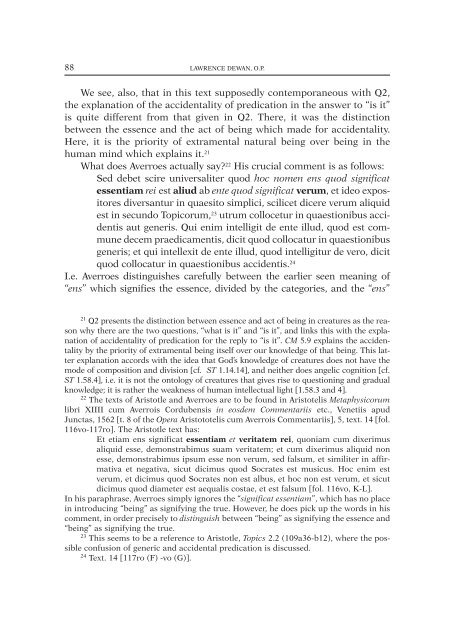
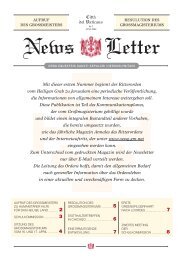
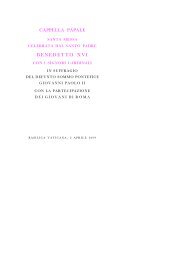
![AAS 01 [1909] - La Santa Sede](https://img.yumpu.com/51456523/1/180x260/aas-01-1909-la-santa-sede.jpg?quality=85)
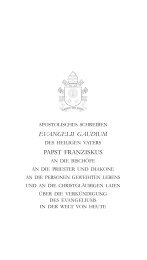
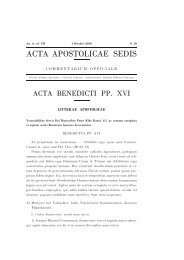
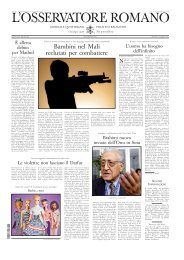
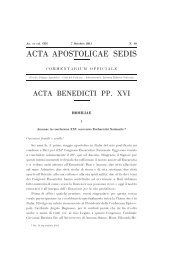
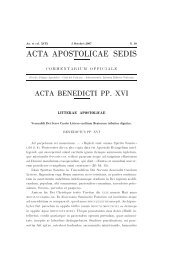
![AAS 20 [1928] - La Santa Sede](https://img.yumpu.com/19772818/1/180x260/aas-20-1928-la-santa-sede.jpg?quality=85)
